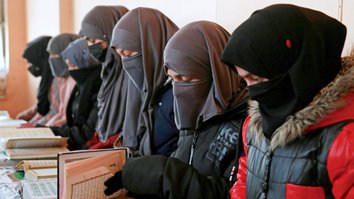KUNDUZ -- The Balkh Department of Hajj and Religious Affairs is in the process of registering all madrassas in the province to ensure students receive proper religious education, officials say.
During the past nine months, the government has registered 140 out of 500 madrassas in Mazar-e-Sharif and districts of Balkh Province, Maulawi Muhammad Danishjo, director of the Balkh Department of Hajj and Religious Affairs, said November 8.
The goal behind the registration process is to improve educational standards and prevent the promotion of radical views among students, he said.
"Currently, the documents of more than 50 madrassas are being processed and they will receive their licences in the near future," he said, adding that some other "madrassas that are not registered ... will receive licences by the end of the year".
"We are serious about registering all the madrassas and monitoring their activities," Danishjo said. "We will close those madrassas that operate in breach of the government's policy."
Almost 150 students acquire Islamic education in each of the madrassas in Balkh Province, he said. By strengthening the madrassas, the government creates opportunities inside the country for young Afghans who would otherwise go to foreign countries for religious education.
"We appreciate the useful activities of madrassas in Balkh Province," he added.
No place for extremism in Islam
Last year, after civil society activists raised their voice regarding the suspected teaching of terrorist views in some madrassas in Balkh Province, the local government responded and started to legally register them, said Abdul Hamid Safwat, director of the Civil Society Organisations Union in Balkh.
"Our findings showed that in some of the unregistered madrassas in Balkh province, young people are encouraged to engage in extremism and there were incidents in which they treated locals roughly," he said.
"We ask that all the educational institutions are registered with the government, and the government needs to monitor them so that madrassas are not used for evil purposes," he said.
The enemies of Islam aim to misuse mosques and madrassas to promote extremism among Muslims; therefore, the public and the government must be on alert, said Sebghatullah Rashidi, a resident of Mazar-e-Sharif.
"I call on the government to prevent the unregistered operations of madrassas in various parts of the country because they promote violence and extremism... and push the country toward religious conflicts," he said.
Acquiring religious knowledge is necessary for young Afghans, but radical views do not have a place in Islam, said Halima Jafari, a student at the Asadia Madrassa in Mazar-e-Sharif.
"Those who misuse the religion because of ignorance and follow other views do not have anything to do with Islam," she said.
The registration of madrassas can help increase their credibility and enable them to teach lawful lessons to students, Jafari said.
The Ikramia Madrassa in Mazar-e-Sharif offers a curriculum based on Islamic values and its personnel will never allow foreign entities to misuse it, said Qari Abdul Aziz Azizi, principal of the madrassa.
"Most Balkh madrassas including ours do not teach subjects or materials that lead to extremist views," he said.
"Government officials are always in contact with the teachers and principals of madrassas, and they participate in students' graduation ceremonies every year," added Azizi. "They are confident that no extremist views are promoted in these madrassas."

![Afghan children read the Koran during Ramadan at a mosque in Mazar-e-Sharif on July 15, 2014. Officials are registering and monitoring all madrassas in Balkh Province to ensure extremist ideas are not part of the curriculum. [Farshad Usyan/AFP]](/cnmi_st/images/2020/11/18/27069-000_del6335682-585_329.jpg)







It is a good measure which should have been taken years before. The madrassas of all provinces of the country should be registered by the Ministry of Education, and the government should pay salary to the teachers. Now it is not known who pays for the teachers of the madrassas, which are not registered by the Ministry of Education. A number of madrassas are directly supported financially by Saudi Arabia and the country pays for the teachers of them as well. The madrassas which are funded by Saudi Arabia teach Salafi jurisprudence and produce thousands of Wahhabis annually. You know that in the past, Afghanistan was a country with most followers of Hanafi jurisprudence, and in the last twenty years, thousands of people have become Wahhabis in the presence of America, and most Wahhabis have tendency towards extremism, especially ISIS. This will be recorded in the contemporary history of Afghanistan, as these people became Wahabis in Afghanistan in the twenty-years' presence of America. Why people were not Wahhabis in the past as they became Wahhabis in the presence of America? I think this is done in coordination with America so that America and the Arab countries can recruit militants this way and achieve their goals.
ReplyI agree with some of your comments. To prevent extremism in Afghanistan's madrassas, the government should establish a number of Sharia universities, these universities should be located in four or five major cities of Afghanistan, those who want to learn religious education should study in these universities, and after graduation from these universities, they should be appointed as imams of the mosques, and the government should no longer allow youths to go to Pakistan and Iran for pursuing religious education in those countries. The government should set a deadline that from now on, people who obtain degrees from Pakistani and Iranian madrassas, their degrees are not credible anymore, and the government will not hire them. Also, it should close all madrassas that operate illegally and are not registered by the government and prevent Wahhabism. Wahhabis are very dangerous for Afghanistan, because they have hostility with Shiites and you know that in Afghanistan the followers of Shia sect have been living like brothers with the followers of Sunni sect in this country for centuries. Afghanistan is a 100% Muslim country and there are two religious sects; namely, Sunni and Shia. People will not accept religions and sects other than these two Islamic sects.
Reply2 Comment